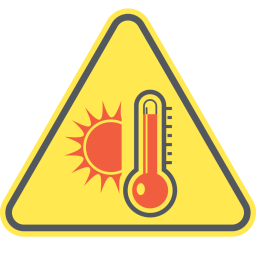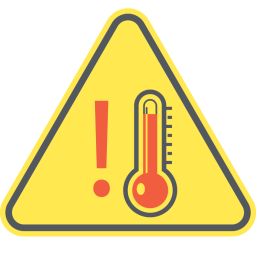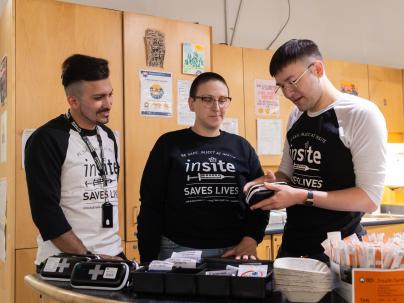極端高溫

高溫可能會危及生命,尤其在極端高溫(又稱「熱浪」)期間,室內溫度過高更是最大的風險因素。不過,與高溫相關的健康危害是可以預防的。請繼續閱讀,了解熱傷害的常見症狀及如何為炎熱天氣做好準備,以確保您自己、家人、朋友和鄰居的安全。
相關主題:氣候變遷與健康
極端高溫對健康的影響
極端高溫事件,又稱為「熱浪」,可能導致多種熱傷害,並提高死亡風險。熱傷害是一個統稱,泛指因高溫引起的各種健康狀況,包括熱疹、曬傷、熱痙攣、熱衰竭,以及最嚴重的中暑。
熱衰竭
熱衰竭的症狀包括:
- 大量出汗
- 長皮疹
- 頭暈
- 感到噁心或嘔吐
- 呼吸急促和心跳加速
- 頭痛
- 注意力無法集中
- 肌肉痙攣
- 極度口渴
- 尿液顏色變深且排尿量減少
若有人出現這些症狀,請協助他們移至陰涼處。您可以讓他們補充水分、為他們鬆開或脫去多餘的衣物,並使用冰袋、濕毛巾或濕衣物幫他們的身體降溫。持續幫他們降溫並補充水分,直到症狀緩解。若症狀惡化或未改善,請盡快尋求醫療護理協助。
中暑
中暑的症狀包括:
- 體溫過高(攝氏 39 度/華氏 102 度或以上)
- 昏厥或嗜睡
- 意識混亂
- 動作不協調
- 皮膚非常灼熱且發紅(可能乾燥無汗)
中暑是緊急醫療情況,請立即前往急診室或緊急醫護中心尋求醫療協助。必要時請撥打 9-1-1。在等待救醫護人員到達期間,盡可能將患者移至陰涼處,並用冰袋、濕毛巾、擦澡、淋浴,或將衣服弄濕等方式來幫助他們快速降溫。持續協助降溫,並陪伴患者直到醫護人員抵達。
若有任何不確定或非緊急的健康疑問,請致電 8-1-1 諮詢護士。
高風險人士
雖然每個人對高溫的反應不同,但有些人較容易出現與高溫相關的健康問題。以下人士須特別注意保持涼爽:
- 年滿 60 歲以上的年長者
- 獨居或與外界隔絕的人士
- 患有糖尿病、心臟疾病或呼吸系統疾病等現有健康狀況的人士
- 患有思覺失調症、憂鬱症或焦慮症等精神疾病的人士
- 患有物質使用疾患的人士,包括酗酒
- 行動不便者
- 居住環境不穩定的人士
- 在高溫環境中工作或生活的人士
- 孕婦
- 嬰幼兒
高溫對每個人的影響不盡相同,有些人可能需要額外協助才能保持涼爽。在天氣炎熱時,請留意自身狀況,並時常關懷高風險族群。預防熱傷害的最佳方式,就是盡量待在涼爽的環境中,並持續補充足夠的水分。

防範高溫危害自己及他人的措施
對多數人而言,熱浪期間最危險的因素是室內高溫。待在涼爽的空間並補充足夠的水分,是預防熱傷害最有效的方法。
此外,野火煙霧也可能對健康造成影響。當野火煙霧和高溫事件同時發生時,建議使用配備 HEPA (high efficiency particulate air filter, HEPA) 濾網的空氣清淨機過濾室內空氣。 點此了解更多關於野火煙霧的資訊。
-
讓自己及他人保持涼爽的方式
- 儘量待在較涼爽的室內或戶外空間(例如有空調的社區活動中心、圖書館或購物中心)。
- 即使未感到口渴,也要多喝水和其他飲料以維持身體水分。
- 淋浴、泡澡,或將身體的部分部位浸泡在水中,有助於身體降溫。
- 穿著濕衣服或披上濕毛巾也能有效降溫。
- 選擇寬鬆、淺色、透氣的衣物,可幫助身體散熱。
- 避免劇烈活動,特別是在一天中最炎熱的時段(卑詩省通常是下午 2 點至 4 點)。
- 留意熱衰竭和中暑的症狀。對於容易受到高溫影響的高風險族群而言,當室內溫度超過攝氏 26 度(華式 78 度)時,熱傷害的風險可能會上升;若室內溫度超過攝氏 31 度(華氏 88 度),風險則會大幅增加。
-
保持空間涼爽的方式
- 白天時,請關閉窗戶並拉上窗簾/百葉窗,可阻擋陽光並維持室內的涼爽空氣。
- 晚上當室外氣溫下降時(在卑詩省通常為晚上 9 點至 10 點),可打開門窗通風。善用浴室或廚房的抽風系統將室內熱空氣排出(僅限於抽風口連接戶外的類型)。夜間可使用移動式電風扇,將外面涼爽的空氣吹入室內。
- 若家中尚未安裝冷氣,可考慮添購冷氣設備。若已有冷氣,請記得開啟使用。
- 記得留意自己和所關懷對象身處場所的室內溫度。對於容易受到高溫影響的高風險族群而言,當室內溫度超過攝氏 26 度(華式 78 度)時,熱傷害的風險即會升高。
「高溫警告」及「極端高溫緊急狀況」
為因應 2021 年卑詩省的熱蓋 (heat dome) 侵襲,多個衛生部門合作夥伴與加拿大環境及氣候變化部 (Environment and Climate Change Canada, ECCC) 共同制定了卑詩高溫警報和應變系統 (BC Heat Alert and Response System, BC HARS)。這套兩級警報系統明確說明了加拿大環境及氣候變化部 (ECCC) 在發布高溫警告(第 1 級)或極端高溫緊急狀況(第 2 級)時所依據的標準,並針對不同等級的警報提供相應的公共衛生訊息與建議行動,供衛生部門、地方政府及其他合作單位參考。
瀏覽卑詩省疾病控制中心 (BC Centre of Disease Control, BCCDC) 的網站,以了解更多有關卑詩高溫警報和應變系統 (BC HARS) 的資訊。
警報等級一覽
-

高溫警告(第 1 級)
威脅狀況: 日間和夜間氣溫高於季節正常範圍,且持續不降。
應變措施: 採取一般防暑降溫措施,並主動關懷熱傷害高風險人士的情況。 -

極端高溫緊急狀況(第 2 級)
威脅狀況: 日間和夜間氣溫高於季節常規標準,且逐日攀升。
應變措施: 啟動緊急應變計劃,並每天至少關懷一次熱傷害高風險人士的狀況。
極端高溫資源
-
-
卑詩省公共天氣警報
加拿大環境及氣候變化部 (ECCC) 發布的天氣警報,包含高溫及空氣品質預警。
-
WeatherCAN 應用程式
加拿大環境及氣候變化部 (ECCC) 推出的智慧型手機天氣警報應用程式,可即時發送高溫與空氣品質相關警報。
-
Hello Weather 語音服務
加拿大環境及氣候變化部 (ECCC) 提供的自動電話語音氣象查詢服務。
-
-
-
極端高溫宣導海報──英文版
溫哥華沿岸衛生局和菲沙衛生局 (Fraser Health Authority)
-
極端高溫宣導海報──翻譯版
溫哥華沿岸衛生局和菲沙衛生局;語言版本包括:英文、阿拉伯文、簡體中文、繁體中文、印地文、韓文、波斯文、旁遮普文、西班牙文、烏爾都文、越南文和古吉拉特文
-
極端高溫期間的健康關懷指南──翻譯版
國家環境衛生合作中心;語言版本包括:英文、法文、旁遮普文、簡體中文、繁體中文
-
極端高溫應變指南──翻譯版
Prepared BC;語言版本包括:英文、法文、旁遮普文、簡體中文、繁體中文
-
極端高溫期間使用電風扇的常見問答
溫哥華沿岸衛生局和菲沙衛生局
-
自備防暑用品指南──翻譯版
溫哥華沿岸衛生局和溫哥華市政府 (City of Vancouver);語言版本包括:英文、旁遮普文、簡體中文、繁體中文、菲律賓文、越南文
-
嬰幼兒熱傷害衛教資源──翻譯版
卑詩省健康連結 (Healthlink BC);語言版本包括:英文、阿拉伯文、簡體中文、繁體中文、波斯文、法文、印地文、日文、韓文、旁遮普文、俄文、西班牙文、菲律賓文、烏克蘭文、越南文
-
共同應對極端高溫
韌性社區組織 (Building Resilient Neighbourhoods) 和鄰里互助專案 (Hey Neighbour Collective);鄰里間的聯繫在高溫事件期間可以挽救生命。瀏覽與鄰居建立聯繫、學習和合作的秘訣。
-
冷氣使用與保養指南
原住民房屋管理協會 (Aboriginal Housing Management Association);提供關於安全且高效使用移動式冷氣機的建議。
-
-
-
適用於非政府機構的高溫關懷支援框架
溫哥華沿岸衛生局和菲沙衛生局
-
高溫關懷培訓影片
溫哥華沿岸衛生局
-
高溫關懷:講師培訓影片
溫哥華沿岸衛生局
-
高溫關懷腳本範例
溫哥華沿岸衛生局
-
高溫關懷培訓簡報
溫哥華沿岸衛生局
-
高溫關懷培訓:講師培訓簡報
溫哥華沿岸衛生局
-
高溫關懷情境演練
溫哥華沿岸衛生局
-
高溫關懷情境演練:引導指南
溫哥華沿岸衛生局
-
適用於多語言長者的極端氣候關懷電話
務適移民服務社 (Multi-lingual Orientation Services Association for Immigrant Communities, MOSAIC)。提供多種語言服務。
-
在炎熱天氣期間設置降溫空間:社區組織指南
溫哥華沿岸衛生局
-
長者緊急支援框架
Renfrew Collingwood 長者協會
-
勞工熱壓力相關資訊
卑詩勞工安全局 (Worksafe, BC)
-
地方政府極端高溫與野火煙霧應變計劃範本
溫哥華沿岸衛生局
-
卑詩省南部內陸社區高溫應變計劃:工具包
內陸衛生局 (Interior Health);協助社區了解並準備高溫應變行動。
-
戶外活動指引
溫哥華沿岸衛生局
-
-
-
企業領導者的職場防暑指引
菲沙衛生局
-
勞工熱壓力相關資訊
卑詩勞工安全局
-
學校與托育機構高溫應對指南
溫哥華沿岸衛生局和菲沙衛生局
-
社區照護機構高溫應對指南
溫哥華沿岸衛生局
-
資源指南:高溫應變規劃
溫哥華沿岸衛生局 (VCH) 和卑詩省緊急狀況管理部門 (Health Emergency Management BC);協助社區照護機構擬定高溫應變計劃,並提供各階段執行月份的建議。
-
高溫應變計劃模板
溫哥華沿岸衛生局 (VCH) 和卑詩省緊急狀況管理部門;可填寫式的社區照護機構高溫應變計劃模板。
-
場地評估清單
溫哥華沿岸衛生局 (VCH) 和卑詩省緊急狀況管理部門;提供詳細的設施與臨床評估清單,以協助社區照護機構規劃高溫應變行動。
-
高風險居民識別指南
溫哥華沿岸衛生局 (VCH) 和卑詩省緊急狀況管理部門;用於評估社區照護機構中熱傷害高風險居民的判別標準。
-
高溫應變準備清單
溫哥華沿岸衛生局 (VCH) 和卑詩省緊急狀況管理部門;提供簡要清單,供社區照護機構在每年高溫季節開始前完成必要準備。
-
高溫應變室溫記錄表
溫哥華沿岸衛生局和卑詩省緊急狀況管理部門;供社區照護機構使用的室內溫度記錄表模板。
-
高溫應變清單
溫哥華沿岸衛生局和卑詩省緊急狀況管理部門;社區照護機構在高溫警報期間的每日準備狀況檢查表。
-
熱傷害:社區照護機構的預防與管理措施
溫哥華沿岸衛生局與天佑護理機構
-
餐飲業極端高溫應對指南
溫哥華沿岸衛生局
-
泳池營運者極端高溫與野火煙霧應對指南
菲沙衛生局
-
-
-
夏季高溫、野火煙霧與對健康的影響:出租物業與分契物業業主及管理人員適用的防護措施
溫哥華沿岸衛生局和菲沙衛生局
-
建築與設施因應極端高溫的準備資源
卑詩房屋局 (BC Housing)
-
租戶高溫關懷卡
卑詩房屋局
-
在炎熱天氣期間設置降溫空間:社區組織指南
溫哥華沿岸衛生局
-
極端高溫與野火煙霧應變計劃組織評估:建築管理單位檢查清單
卑詩房屋局
-
醫療專業人員資源
-
-
極端高溫期間的社區照護指引
加拿大衛生部 (Health Canada)
-
極端高溫期間的急症護理指引
加拿大衛生部
-
野火煙霧與極端高溫應變行動計劃(含醫護團隊指引)
呼吸道健康研究傳承倡議 (Legacy for Airway Health)、卑詩大學 (University of British Columbia, UBC)、溫哥華沿岸衛生局 (VCH) 研究院
-
極端高溫期間的醫療機構應對準備指引
加拿大衛生部
-
醫護人員技術指南
加拿大衛生部
-
藥劑師指引(含藥物相關風險因素)
加拿大衛生部
-
極端高溫與野火煙霧的常見問題
溫哥華沿岸衛生局
-
極端高溫與野火煙霧醫護人員資源
溫哥華沿岸衛生局
-
















